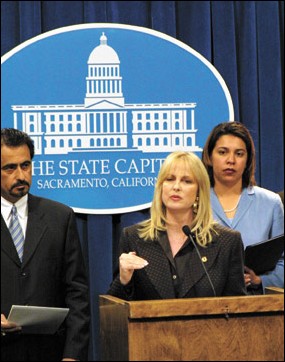CSU under fire for computer spending

Image: CSU under fire for computer spending:Assemblywoman Rebecca Cohn said the issue facing the CSU system would never happen in the private sector.Photo by Jason Lehrbaum/State Hornet:
March 13, 2003
State legislators blasted California State University officials and called for an investigation of the CSU after an audit report said the system overspent hundreds of millions of dollars on a computer system that may not even work.
“Heads will roll,” said Calif. Senator Gloria Romero (D – Los Angeles). “Notice I said ‘heads’, plural.”
Romero’s comments came on the heels of the Legislative Auditor’s Tuesday report that the CSU system’s Common Management System will run $200 million over the $440 million planners projected in 1999.
The goal of the project is to replace the outdated patchwork of computer systems and incompatible software programs at all CSU schools and the chancellor’s Long Beach office. Software giant PeopleSoft, Inc. is contracted to design the software, which would allow the far-flung 23-campus system to share student records, payroll information and a host of other data.
Senator Richard Alarcon (D – San Francisco) blasted Chancellor Charles B. Reed’s office and vowed to bring the full weight of the legislature to bear.
“This audit will not collect dust. We will respond to it. They violated our trust with the students,” Alarcon said.
But Reed brushed aside the criticism, asserting that the audit actually vindicated the 5-yer-old program.
“The audit nowhere questions the need for the system, it doesn’t say stop doing it, it’s not needed,” Reed said. “Nowhere in the audit does it allege any wrongdoing.”
Alarcon and Assemblyman Manny Diaz (D – San Jose) called for an audit of the CSU system’s CMS after faculty and students, including former Sac State ASI president Artemio Pimentel, voiced concerns last year that the CMS was siphoning money from education, retention and outreach programs.
Pimentel, a graduate student, is the president of the California State Students Association, which lobbies legislators on behalf of CSU students.
To date, the CSU has paid about $300 million for the system, with costs are projected to go as high as $662 million.
“The number of findings in the report are disturbing and said the chancellor’s office acted without a business plan,” said Rebecca Cohn, chairwoman of the Joint Legislative Audit Committee. “It would have never been done like this in the private sector.”
Diaz said there is no accountability for the way the CSU spends on its computer systems, as other state agencies do. Diaz wants to change that and bring CSU in line with the rest of state.
“Our worst fears were realized,” he said.
Almost half the money has already been spent on the project, Diaz said, and legislators don’t know what contracts are still pending. That uncertainty complicates whether the legislature force the CSU to halt the CMS project while they investigate.
He said more information will come out in the coming weeks.
Millions of dollars were spent on consulting alone, Cohn said. One consultant was paid $300,000 their first year, and one year later almost to the date, the price doubled, she said.
According to the audit, Assistant Vice Chancellor of Information Technology Services, David Ernst, received monies form PeopleSoft while he was involved in the software selection process.
When contacted earlier this week, PeopleSoft said they could not confirm payments for Ernst.
Ernst said he did not take part in the meetings where the software selection was discussed, but the audit he evaluated the software and was part of the final contract negotiations.
“These practices are shameful, and we must stop them,” Alarcon said.
Alarcon and Diaz sent a letter to the state attorney general requesting an investigation looking for any criminal wrongdoing.
The CSSA is also calling for the attorney general to look into the matter.
Pimentel said the concept of CMS is a good and will bring the CSU’s together, but wants it put on hold pending the outcome of an investigation.
Pimentel was concerned the cost CMS is related to the 10 percent hike in tuition passed by the Board of Trustees in December. The board is considering a 25 percent hike to compensate for cuts in Gov. Gray Davis’ budget proposal for 2003/04.
California Faculty Association representative Patricia Hill said the CFA was disappointed that Chancellor Reed took a cavalier attitude toward the audit. Hill called for moratorium of the new computer system until it can be investigated further.

























































































































